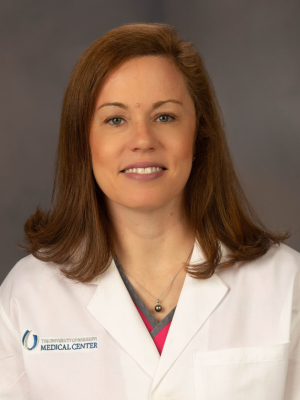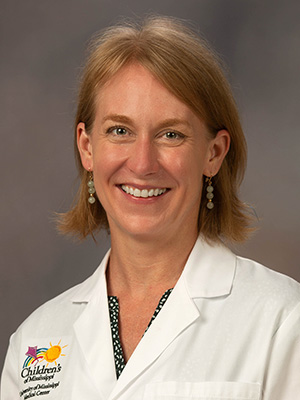Breastfeeding gives babies the best start, experts say
Breastfeeding is the ideal choice for newborns, but new mothers often have many questions. At the University of Mississippi Medical Center’s Wiser Hospital for Women and Infants, lactation specialists are available to ensure that mothers get the best possible start.
"After delivery, our lactation specialists stop by to see mothers to help them latch and to be aware of signs that their babies are getting enough milk,” said Marci Talbot, a registered dietitian with the UMMC Lactation Services. “During the week, we see new mothers at least twice a day. We also connect families to resources such as WIC (Special Supplemental Nutrition Program for Women, Infants and Children) that support breastfeeding.”
WIC, a program of the U.S. Department of Agriculture, serves about 40% of all infants in the country.
Breastfeeding is a focus for UMMC, the first hospital in the metro Jackson area to be designated as a Baby-Friendly Hospital by Baby-Friendly USA and the second in the state to reach the milestone. The entire labor and delivery and mother-baby teams have been trained to assist mothers with breastfeeding.
UMMC earned the title in 2017 and was redesignated in 2023. Mississippi currently has 30 Baby-Friendly USA hospitals, and nationally more than 600 hospitals hold the designation.
Creation of the Mother Baby Unit where infants room in with moms, encouragement of skin-to-skin contact between mother and baby soon after delivery and helping mothers start breastfeeding within an hour after giving birth have all been aimed at providing optimal maternal and baby care.
"Being a Baby-Friendly Hospital means committing to the highest standards of infant care and maternal support,” said nurse educator Laurie Crumpton. “Breastfeeding is not just encouraged but actively supported, ensuring that every baby receives the best start in life, and every family feels empowered and educated in their parenting journey."
Breastmilk is the best source of nutrition for most babies, and it adjusts to babies’ needs as they grow. According to the U.S. Centers for Disease Control and Prevention, breastmilk can protect babies against some illnesses. Breastfed babies have a lower risk of asthma, obesity, type 1 diabetes and sudden infant death syndrome (SIDS) and are less likely to have ear infections and stomach viruses.
The American Academy of Pediatrics recommends breastfeeding exclusively for a baby’s first six months, with continued breastfeeding along with the introduction of complementary foods through age 2 or older.
Mothers benefit from breastfeeding, too. Not only is breastfeeding more convenient and lower in cost than formula, but breastfeeding can reduce a mother’s risk of breast and ovarian cancer, type 2 diabetes and high blood pressure.

“Breastfeeding helps in the release of oxytocin, a hormone that promotes uterine contractions, aiding in reducing postpartum bleeding and helping the uterus return to its pre-pregnancy size,” said Dr. Rachael Morris, associate professor of obstetrics and gynecology. “Additionally, breastfeeding burns extra calories, which can help with postpartum weight loss. Long-term, it has been associated with a reduced risk of breast and ovarian cancers, as well as osteoporosis. Breastfeeding also fosters a deep emotional bond between the mother and her baby, contributing to the mother’s mental well-being.”
To help families continue breastfeeding after coming home from the hospital, UMMC offers a lactation clinic at the newborn clinic at Eli Manning Clinics for Children, where babies have their first wellness visit after birth.

The clinic has experienced growth in its first year, said Dr. Leigh Campbell, assistant professor of neonatology, director of the lactation clinic and an International Board-Certified Lactation Consultant (IBCLC).
“We have been out in the community and gave a presentation at the Mississippi Breastfeeding Coalition MILC (Making an Impact in the Lactation Community) Conference in August,” she said. A research poster has been accepted for the Academy of Breastfeeding Medicine Conference in November, and the team has presented grand rounds on breastfeeding and continuing education with CME credits for local pediatricians.
“We work alongside the postpartum inpatient IBCLC team to ensure consistency of practice,” she said.
The clinic is also ready to provide support for mothers whose babies are in neonatal intensive care to help them pump milk to give their babies the nutritional benefits of breastmilk, said family nurse practitioner Marianna Riley, who also holds the IBCLC certification and is a clinician with Campbell.
Watching for conditions that could make breastfeeding more difficult is part of care. “Most recently, we have collaborated with our physical and occupational therapy team to assess infants for torticollis in our clinic – which can affect feeding and latch – and appropriately refer,” Campbell said. In torticollis, the baby’s neck muscles cause the head to be held at an angle.
The lactation clinic will refer mothers and babies for care if other conditions, ranging from maternal mental health to pediatric issues, are spotted.
“Our goal is to offer comprehensive care and support the family as a unit,” Campbell said.
Mothers can call 601-984-5480 to schedule an appointment at the clinic, which is open Monday through Friday from 8 a.m. to 4 p.m.
The above article appears in CONSULT, UMMC’s monthly e-newsletter sharing news about cutting-edge clinical and health science education advances and innovative biomedical research at the Medical Center and giving you tips and suggestions on how you and the people you love can live a healthier life. Click here and enter your email address to receive CONSULT free of charge. You may cancel at any time.



